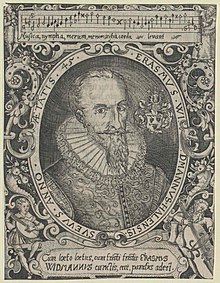Erasmus Widmann
Erasmus Widmann (born September 15, 1572 in Schwäbisch Hall , † October 31, 1634 in Rothenburg ob der Tauber ) was a German organist and composer .
Life
Widmann, who comes from the Widmann family of scholars , received a good musical education under Johannes Crusius while he was still in Latin school . In 1589 he enrolled at the University of Tübingen and graduated as baccalaurius the following year . In 1595 he worked as an organist in the mining town of Eisenerz (Styria) , then from 1596 to 1598 in Graz . In the course of the Counter Reformation and the expulsion of the Protestants, he had to a. left Styria together with Johannes Kepler and Veit Bach and returned to Schwäbisch Hall. Here he took on a position as cantor and Latin school prefector. From 1602 he was Kapellmeisterand organist of Count Wolfgang von Hohenlohe-Langenburg in Weikersheim , from 1607 he was completely released from his teaching duties and was solely responsible for the court orchestra. In addition to organizing music, he wrote texts, comedies and his own songs, which appeared in print in the Musikalische Kurtzweil , among others .
After the death of Count Wolfgang in 1610, his successor Georg Friedrich demanded that Widmann devote himself again to teaching. Dissatisfied with this, Widmann looked for a new job and from 1613 worked as a preceptor and cantor at the grammar school in Rothenburg ob der Tauber . Here he wrote his Musical Virtue Mirror (1613) as well as the continuation and expansion of the Neue Musikalische Kurtzweil (1623). Since 1627 Widmann referred to himself in his publications as " Poet Prince" ( Poeta Laureatus Caesareus ). In 1628 the previous sub-cantor Sebastian Stüx took over his office.
In 1629, Widmann wrote his Piorum suspiria in response to the horrors of the Thirty Years' War . After his wife and a daughter, he too succumbed to the plague in October 1634, his son Georg Friedrich (born March 8, 1603) took over his position as organist of St. Jakob.
The Erasmus-Widmann-Gymnasium in Schwäbisch Hall is named after him.
Works
- Spiritual psalms and songs , 1604
- First part of new German chants with completely new possessorial and two-part texts , 1606
-
The musical Kurzweil (1611) , Verlag C. Hofius Ammerbuch, 2012, ISMN 979-0-50248-083-7 (search in the DNB portal)
- The geese
- The flea
- Mouse song
- O Musica, lovely art
- Vinum pour
- Musical mirror of virtue of completely new song (Daentz and Gaillarden) , Rothenburg 1613
- New knightly elevation from Kampff and Streyt between Concordia and Discordia , Augsburg 1614/1620
- Musica Praecepta lationo-germanica pro schola Rotenburg-Tubarina brevissime constripta , Nuremberg 1615
- Gantz Neue Cantzon, Intraden, Balletten und Courranten , 1618
-
New ecclesiastical Germans and Latin motets 1619 , u. a .:
- X .: Praised be the Lord, my hoard (SSATTB)
- XI .: Lord, what is man (SSATTB)
- XIII .: The Lord keep you (SSATTB)
- Wohlauf, your guests well (around 1620)
-
Balthasari Musculi Extraordinary Gesänglein 1622
- Let us praise the Lord
- Musical student courage, darinn very new to sing little chants covered with funny texts and to use them on all kinds of instruments with four and five voices (Nuremberg 1622)
- New Musical Kurtzweill (1624)
- Libellus antiphon. Hymn & Responsoria continens , Rotenburg 1627
- Augusta Vindelicorum Gratiae , 1633
- Come here, students free
- Who has desire and love for music
- Well run, soldiers blood
- Suite des dames (instrumental dances for 5 voices)
- To Miltenberg on the Maine, to Würzburg on the stone
- A rich merchant in French-speaking countries
- Jesus, red in your wounds
- Jesus, my heart sigh a lot
literature
- Ludwig Julius Fränkel: Widman (n) . In: Allgemeine Deutsche Biographie (ADB). Volume 42, Duncker & Humblot, Leipzig 1897, pp. 344-352. (Family article, therein p. 346 about Erasmus Widmann)
- Pastors' book Württembergisch Franconia . Part 2. Arrangement by Otto Haug with the collaboration of Max-Adolf Cramer and Marlene Holtzmann. Stuttgart 1981, no.2930.
- John Flood: Poets Laureate in the Holy Roman Empire. A Bio-bibliographical Handbook . Vol. 4 (2006), pp. 2248-2250 ( ISBN 978-3-11-091274-6 accessed from De Gruyter Online).
- Albrecht Classen: Erasmus Widmann (1571-1634) - Edition of his secular, entertaining and didactic songs and chants , Weidler Berlin 2011, ISBN 978-3-89693-292-1 .
- Andreas Traub / Rainer Bayreuther: Erasmus Widmann (1572–1634) . In: Rainer Bayreuther / Nikolai Ott (eds.): Choir composers in Württemberg , Esslingen a. a .: Helbling 2019, ISBN 9783862274185 , pp. 10-17.
Web links
- Works by and about Erasmus Widmann in the catalog of the German National Library
- Publications from and about Erasmus Widmann in VD 17 .
- Erasmus Widmann in the Bavarian Musicians' Lexicon Online (BMLO)
- Erasmus Widmann on MusicBrainz (English)
- Sheet music and audio files from Erasmus Widmann in the International Music Score Library Project
Individual evidence
- ↑ In the Universal Lexicon von Zedler 1749 Widmann is referred to as the imperial crowned Poeta laureus .
- ↑ Information on the person and work of Erasmus Widmann
| personal data | |
|---|---|
| SURNAME | Widmann, Erasmus |
| BRIEF DESCRIPTION | German organist and composer |
| DATE OF BIRTH | September 15, 1572 |
| PLACE OF BIRTH | Schwäbisch Hall |
| DATE OF DEATH | October 31, 1634 |
| Place of death | Rothenburg ob der Tauber |
